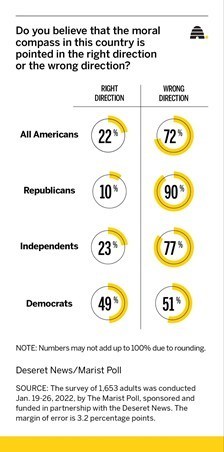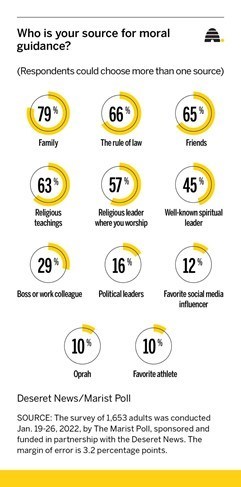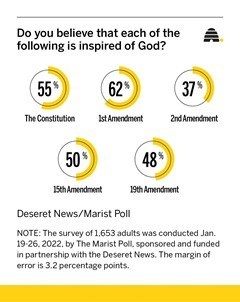More than 70% of Americans Believe Nation’s ‘Moral Compass’ Pointed in Wrong Direction
A new survey, conducted by The Marist College Poll, highlights trends on faith and religion in America
The Deseret News “Faith in America Survey,” conducted by The Marist College Poll, reveals a growing trend in the country: Americans retain core religious beliefs even as they are less attached to religious practices and institutions, such as daily prayer and attending services. Furthermore, a substantial majority of Americans are deeply concerned over the country’s moral direction.

“While the state of religion is continually changing, our study found that the majority of Americans still hold core religious beliefs and draw moral guidance from their families and their faith traditions,” said Hal Boyd, Executive Editor of Deseret National. “The vast majority of Americans, 7 in 10, believe the country would be better off if we prayed for each other. And most Americans say the U.S. Constitution was inspired by God. Despite headlines that emphasize religion’s decline, faith remains a strong moral force in American life.”
Several highlights from the full survey, conducted Jan. 19-26 this year from 1,653 U.S. adults, include:
Americans retain belief in the Biblical God and embrace “spirituality,” even as they are less attached to religious practices and institutions.
- For example, 54% of Americans report they believe in God as described in the Bible—this includes 86% of all those who practice a religion and one in three (33%) individuals who report they do not practice a religion.
- About 7 in 10 Americans (71%) consider themselves spiritual, regardless of whether they practice religion or not.
- Only 40% of adults report attending a religious service at least once or twice a month. This is a noticeable decline from an April 2011 Marist Poll which revealed that 52% of Americans attended religious services at least once or twice a month.
- Attendance at religious services is also influenced by age: Americans 60 or older (43%) are the most likely to attend services at least weekly. This practice decreases significantly with younger Americans: 45-59 (27%), 30-44 (25%) and 18-29 (21%).
A majority of Americans (72%) believe “the nation’s moral compass is pointed in the wrong direction.”
- This is the perspective of not only observant Christians (74%), but even non-religious Americans (69%).
- Consensus, however, changes by party affiliation: 90% of Republicans say America’s moral compass is broken, yet only half (51%) of Democrats say the same.
- Less than one in four (22%) of Americans actually believe the nation’s moral compass is pointed in the right direction.
American adults do not believe religion is a requirement for morality.
- An overwhelming majority (91%) of those who do not practice a religion believe it is necessary to follow the Golden Rule in their personal lives.
- This represents hardly any difference between those who practice religion as a whole (93%) and believe it is necessary to follow the Golden Rule in their personal lives.
- Similar proportions report that following the Golden Rule in their professional lives is just as necessary.

Americans look first to close relationships—such as family (79%) and friends (65%)—and the rule of law (66%) as their sources of moral guidance.
- Religious teachings (63%) and religious leaders where they may worship (57%) come in fourth and fifth.
- Popular figures, such as social media influencers, TV personalities and athletes, come in last.
- Most Americans do not look to political leaders or celebrities for moral guidance.
- Only 16% of Americans, including 18% of those who practice a religion, 17% of Christians, and 14% of those who do not practice a religion say they are likely to look to political leaders for moral guidance. Oprah (10%), favorite athletes (10%) and favorite social media influencers (12%) are even less influential in forming one’s morality.
When it comes to religion’s role in politics, a strong partisan divide emerges.
- Republicans (70%) are significantly more likely than Democrats (28%) and Independents (45%) to believe someone’s politics should be influenced by their religion.
- This partisanship appears as well in the belief that the U.S. Constitution was inspired by God. Looking at the Constitution as a whole, Republicans (81%) overwhelmingly believe it was inspired by God, while 55% of Independents and only 36% of Democrats agree.
- Americans are much less convinced that divine inspiration played a role in the Second Amendment: only 37% of adults believe God was behind the right to bear arms.

Content created by Conservative Daily News and some content syndicated through CDN is available for re-publication without charge under the Creative Commons license. Visit our syndication page for details and requirements.




